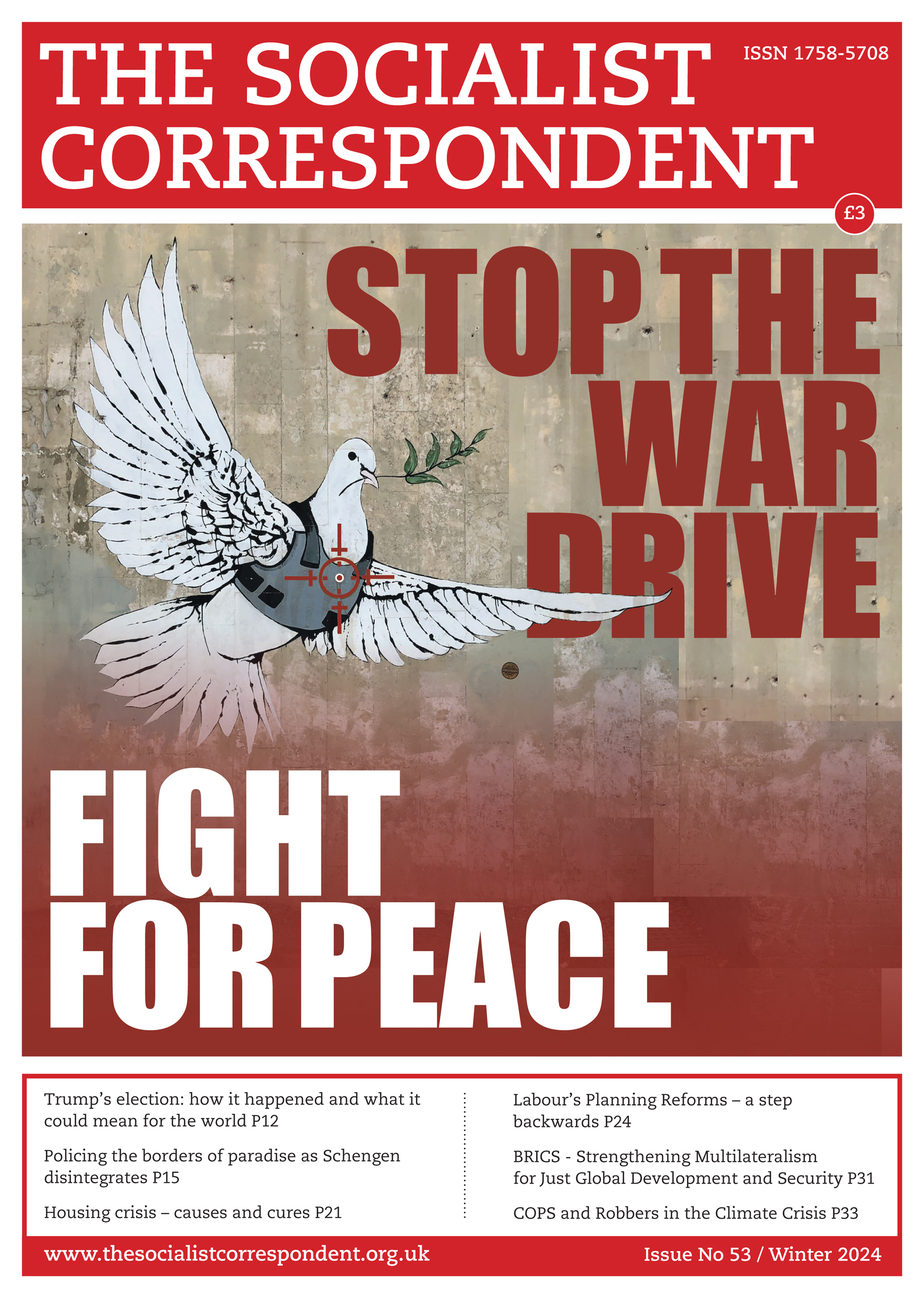Issue 53 Winter 2024
CONTENTS: The danger of world war - can it be stopped, Simon Korner: The fight for peace and disarmament, Gary Lefley: Trump's election: how it happened and what it could mean for the world, Steve Howell: Policing the borders of paradise as Schengen disintegrates, Clare Bailey: Housing crisis - causes and cures, Pat Turnbull: Labour's planning reforms - a step backwards, Peter Latham: Israel interfering with democracy, John Moore: A window into Russia, Gregor Tassie: BRICS - Strengthening Multilateralism for Just Global Development and Security, Jay Woods: COPS and robbers in the climate crisis, Brian Durrans
COMMENTARY
Overthrow of Assad deepens crisis in the Middle East
It is too early to say what the exact causes and outcomes of the overthrow of President Assad of Syria are, and as we go to press things could still change quite dramatically. Yet a few contours can be seen.
This is a victory for the West which Assad long resisted, and whose overthrow leaves Syria open to competing Western and regional powers including Turkey, Israel and the United States not to mention the Kurds and different terrorist groups within the country. It is difficult to see how this can have a stable and peaceful outcome. But the West often prefers instability to a strong opponent – it happily created chaos in Libya. And as with Libya the United States, which has boots on the ground, is interested in Syria’s oil.
The overthrow of Assad is also a major blow to Russia and to Iran, the latter already under increasing pressure from Israel’s attacks on Hezbollah in Lebanon. Israel has been actively involved, and is currently bombing Syria and annexing territory. A further consequence is that this shift in the balance of forces in the Middle East weakens the position of the Palestinians.
These are all immediate consequences. In the longer term, however, the aggressive powers may be storing up as yet unforeseen difficulties for themselves. We will have in-depth analysis of events in Syria in the next issue of The Socialist Correspondent.
The threat of war
Events in Syria are another demonstration of the parlous state of the world with widespread war and the threat of war which could spark global conflict including an increasing risk of nuclear weapons being used. Simon Korner in, The danger of world war – can it be stopped? sets out the historical precursors to previous world wars and identifies similar trends occurring now. He points to factors such, a major arms race, the formation of rival armed blocs and a series of smaller wars leading to a general conflagration finding disturbing parallels today. He looks in more detail at the three fronts of war – two underway in Ukraine and Gaza and the third that the US is preparing the ground for – a war with China. Yet the global majority reject this drive to war and is colaborating more closely in trade and diplomacy. The US is loosing friends among its erstwhile allies and the poeples of western countries are increasingly sceptical of war. But will this be enough to stop imperialism?
In, The fight for peace and disarmament, Gary Lefley points to the urgent tasks of the peace movement in Britain. As people continue to suffer poverty, cuts to services and crumbling infrastructure yet the government plans to increase arms spending to 2.5%of GDP or £87.1 billion including massive expenditure on replacing the Trident nuclear weapons system. This has nothing to do with self-defence and everything to do with Britain playing its part in fighting wars and imposing military power across the globe. Not only could this money be better spent elsewhere but Britain’s active involvement in wars such as Ukraine make this country a target. He poses the alternative to an imperialist, warmongering UK, arguing that we could take the path of non-alignment and join with others, like BRICS, to have a more secure and prosperous future.
Trump’s return
But what will the prospects for the world be with Donald Trump back in the White House? Steve Howell considers this question in Trump’s election: how it happened and what it could mean for the world. It is not entirely certain how Trump will approach the war in Ukraine, but there is an increasing shift in the establishment towards the realistic view that Ukraine cannot win on the battlefield and that there should be negotiations. Other things are clearer. Trump will maintain a firm support for Israel’s genocide in Gaza and ramp up hostility towards China as a prelude to war.
Howell also considers why Trump won and Kamala Harris lost the Presidential election. Breaking down the statistics of where the Democrats lost ground he identifies how the conscious neglect of core voters led to a drop in support for the Democrats through abstention, with Trump also capitalising on this disaffection. A failure by the Democrats to address the needs of working class Americans as well as alienation on the issue of Gaza were among the factors at work.
Labour’s failures
Similar failures afflict the Labour government here. Despite a huge majority Labour will not challenge big business or the establishment with the result that it is disappointing its voters. Two areas where Labour is not delivering are housing and planning which are considered by Pat Turnbull in, Housing crisis – causes and cures and by Peter Latham in Labour's Planning Reforms – a step backwards. In both these policy areas Labour has not grasped the need for state intervention to fund and strategically plan to meet people’s needs in housing and the environments they live in.
Supporting the US war drive and failing to meet the needs of working class people will not be a winning formula for Labour.
Read the PDF version of Issue 53

